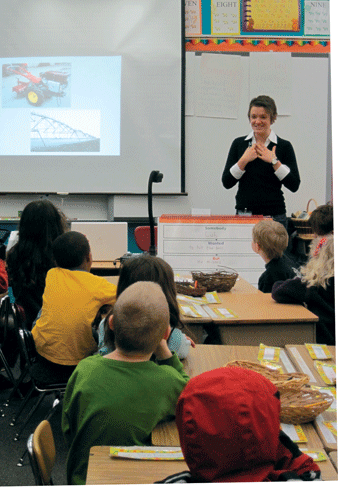2011-12 Graduate Road Scholars Presentations
For the third academic year, the UO Center for the Study of Women in Society is again offering talks by UO graduate students through the Graduate Road Scholars program. The graduate Road Scholars are offering 20–30 minute presentations, available to Eugene 4J students, the Springfield Public Schools, local public libraries, and the OSHER program from mid-October 2011 through the end of the school year. CSWS provides the speaker and supporting materials at no cost to participating organizations. Listed below are the topics for 2011-12.
“Water Rights Are Women’s Rights”
Presenter: Megan Burke, master’s student, UO Department of Philosophy; M.A., Women’s Studies, San Diego State University
“(In)famous Angel: The Cherub Company and the Problem of Definition”
Presenter: Brian Cook, a PhD student in Theatre Arts
“The Impact of Microfinance on Women’s Empowerment in Bolivia”
Presenter: Alejandra Garcia, master’s student, UO Department of Planning, Public Policy and Management; M.A. Gender and Women Studies, Armstrong Atlantic State University
“Attachment Theory and Women’s Subjection”
Presenter: Katherine Logan, PhD candidate, Philosophy Department
“Gendered Identities and Associational Life of the Peul in the Paris Ghettos”
Presenter: Laura Gerard Massengale, graduate student, International Studies
“Huge Challenges: Fat Acceptance on Television”
Presenter: Mara Williams, PhD Student in UO School of Journalism and Communication; MA Media Studies, University of Wisconsin Milwaukee
2010-11 Graduate Road Scholars
The Center for the Study of Women in Society recently held its second annual competition for the CSWS Graduate Road Scholars Program. Four UO graduate students will visit local classrooms through the program to speak on feminist topics. The 20- to 30-minute presentations are offered free of charge to Eugene 4J and Springfield middle and high school classes. The UO students were selected from a pool of applicants and will each receive a $200 stipend. The students and their topics are:
Water Rights Are Women’s Rights
Megan Burke, master’s student, UO Department of Philosophy
Women’s work is integrally linked to water and the need for free access to it. It is women and girls who are both responsible for providing water to households and who, due to economic disparity between women and men, rely on free, safe drinking water. This discussion-based presentation will address the need to consider the use and production of bottled water and how it affects women and girls around the globe.
Re-Writing Fairy Tales: Angela Carter’s Inversion of Stereotypes in Little Red Riding Hood
Antonio José Couso-Liañez, master’s student, UO Department of Romance Languages, Spanish
The feminist writer Angela Carter (among others) re-writes traditional fairy tales, looking back at their origins in oral tradition and folklore in order to question and change the stereotypes of women’s passivity. Antonio Couso-Liañez will talk about Carter’s efforts to invert stereotypes in order to overturn social assumptions of gender.
Gender Roles in Rural Entrepreneurship: A Bolivian Experience
Alejandra Garcia, master’s student, UO Department of Planning, Public Policy and Management
Alejandra Garcia helps facilitate a focus group session with microfinance clients in Sucre, Bolivia.
Alejandra Garcia did research last summer among indigenous peoples in rural areas of Bolivia, her native country. She recorded a series of testimonials of women, which she will draw upon in her analysis of gender issues. Garcia looks at poverty reduction strategies such as microfinance and describes experiences of women leaders who have been able to achieve integration and equity as entrepreneurs.
Roller Derby: Identity and Cultural Studies
Rebecca Toews, M.S. student, UO School of Journalism and Communication
Roller derby as a pastime and athletic event is an outlet for bankers, lawyers and doctors, but these women also embody the roles of students, punks and hipsters. The sport includes women of any age, whether married, mothers, single, gay or straight. It embraces sometimes raunchy humor, but also pegs itself as a family event. Although the culture doesn’t fit neatly into ideas about traditional roles of women, some argue that the sport is just another form of objectification. This presentation delves into contradictory definitions of what it means to be powerful and beautiful in contemporary society—and whether sex appeal is a necessary component for women’s sports to appeal to fans and participants. It also covers the history of the sport.




